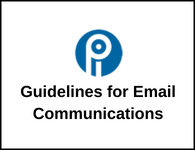Guidelines for Email Communications
(All members)
Background
The Institute is committed to providing a collegial working environment in which all individuals are treated with respect and dignity. Use of the email system will be respectful at all times. We should all expect that the language used in our email communications will reflect the Institute's professionalism and values.
To ensure professional and respectful use of the email system, and to provide all employees and members of the Institute best practices related to email communication.
Best Practices for Professional and Respectful Email Etiquette refers to the use of email within the Institute.
- TO: field for action required
- CC: field for information purposes only
- Don’t be part of an email flame war Flame wars are heated e-mail exchanges that are more emotional than reasoned, and they have no place in professional communications.
- Before sending, reread the entire e-mail, not all communication should be done by email.
- If your email could be contentious or negative, sit on it and follow the 24 hour rule before responding by email.
- Be specific in your request if you require feedback, or action is required.
- Only include individuals who are impacted or need to know the information.
- Keep it short and sweet. A longer email doesn’t mean that you have covered all points; it just means you have given more zone-out room to the reader.
- Before sending an email, ensure it would not cause harm or embarrassment to anyone including PIPSC, if it was seen publically.
- Know when to use email, Instead of firing off a complicated explanation via e-mail, set up a short meeting to address the issue in person. E-mail is also a poor stand-in for conversation when conducting critical, difficult, and/or unpleasant discussions, touchy communications are best handled in person.
- Have a second set of eyes review an email in certain situations.
- Include a closing; Let the reader know you're done by including a complimentary closing and signature.
- Obey etiquette rules when forwarding messages, Before you forward an e-mail, make sure that all recipients need to receive the message. In addition, be careful when forwarding sensitive or confidential information. Never forward proprietary information to external audiences or to unauthorized recipients. Before clicking the send button, review whether a message's contents are appropriate for each listed recipient.
- Be Professional: The Professional Institute, It's easy to convey the impression that you're unprofessional or careless if you don't follow some basic principles of good business writing. Make sure you follow proper grammar and sentence structure when composing and responding to messages and use a spell checker. Don't type in all capital letters—it creates the effect of shouting. Break your message into paragraphs for logic and readability.
Approved by the Board of Directors – March, 2017


